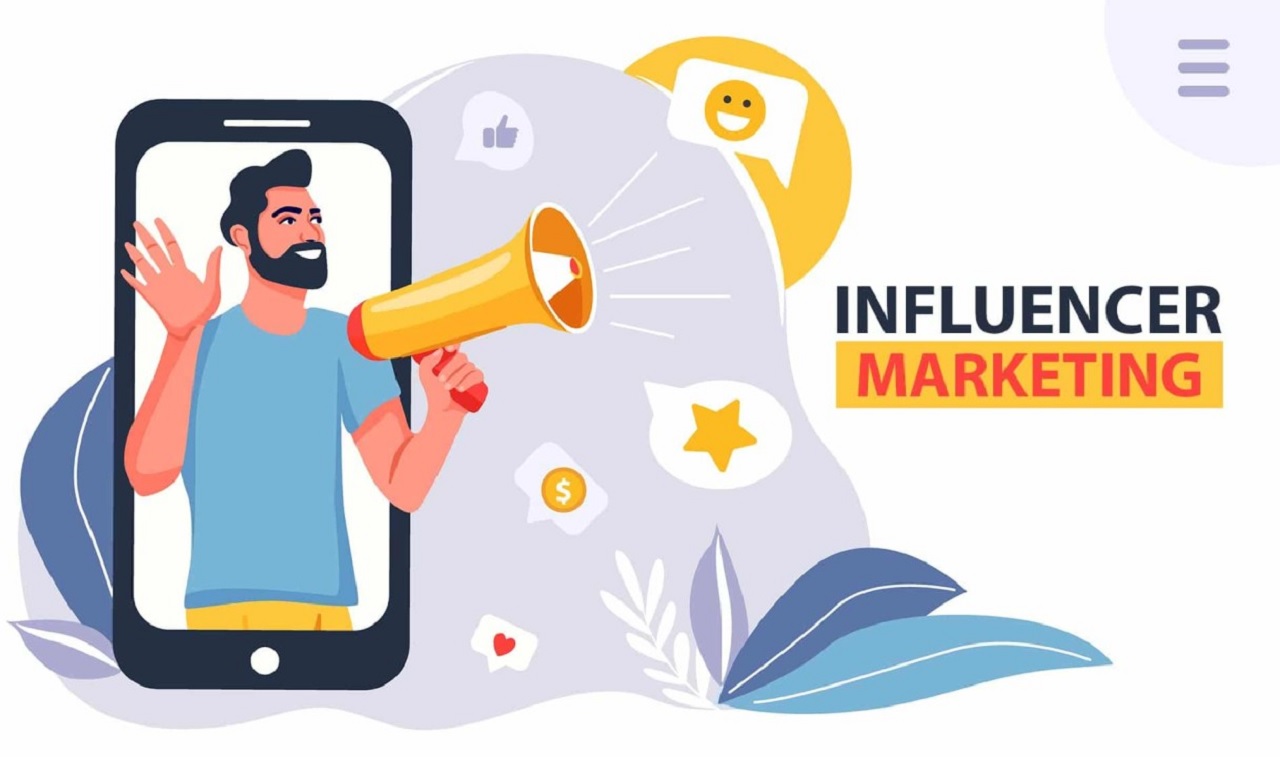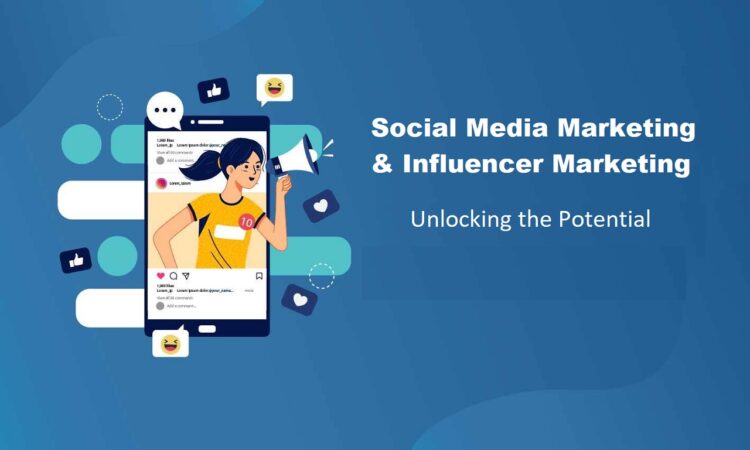Social media has revolutionized the way businesses connect with their audience. With billions of active users across various platforms, social media has become an indispensable tool for marketing and brand promotion. In recent years, another dynamic strategy has emerged as a powerful force in the digital landscape: influencer marketing.
This article explores the symbiotic relationship between social media marketing and influencer marketing. We will delve into their definitions, benefits, and how they can work together to amplify a brand’s reach and engagement.
By understanding the fundamentals and strategies behind these two interconnected approaches, businesses can leverage them effectively to achieve their marketing goals.
I. Understanding Social Media Marketing

Social media marketing has transformed the way businesses engage with their target audience in the digital age. With the proliferation of social media platforms like Facebook, Instagram, Twitter, and LinkedIn, brands have gained unprecedented access to billions of active users worldwide.
Social media marketing involves leveraging these platforms to promote products, services, and brand messages, with the goal of driving brand awareness, fostering customer engagement, and generating leads.
By understanding the fundamentals and scope of social media marketing, businesses can tap into its immense potential to connect with their audience on a personal level and cultivate a loyal customer base.
A. Definition and Scope of Social Media Marketing
Social media marketing refers to the use of social media platforms to promote products, services, and brands. It involves creating and sharing content, engaging with users, and running targeted advertising campaigns. The scope of social media marketing is vast, encompassing platforms like Facebook, Instagram, Twitter, LinkedIn, and others.
Social media marketing plays a crucial role in brand awareness, customer engagement, and lead generation. By establishing a strong presence on social media, businesses can reach a wider audience and connect with potential customers.
The interactive nature of social media platforms allows for real-time communication and engagement, enabling businesses to build relationships with their target audience.
B. Benefits of Social Media Marketing
Social media marketing has become an essential component of modern business strategies, offering numerous benefits for brands. By leveraging social media platforms such as Facebook, Instagram, Twitter, and LinkedIn, businesses can reach a vast audience, increase brand visibility, and foster meaningful connections with their target customers.
Social media provides a cost-effective way to promote products and services, engage with followers, and build brand loyalty. Additionally, it enables businesses to gather valuable customer insights, facilitate customer service, and drive website traffic, ultimately leading to increased conversions and revenue.
With its wide reach, interactive features, and targeted advertising capabilities, social media marketing empowers brands to establish a strong online presence and stay competitive in today’s digital landscape.
Wider Reach and Targeted Advertising
One of the significant advantages of social media marketing is its ability to reach a large and diverse audience. Social media platforms have billions of active users, providing businesses with an opportunity to connect with people from different demographics and geographical locations.
Moreover, these platforms offer robust advertising options that allow businesses to target specific audience segments based on factors like age, location, interests, and behaviors.
Enhanced Customer Engagement and Interaction
Social media platforms provide a space for businesses to engage directly with their customers. Through features like comments, direct messages, and live chats, businesses can have meaningful conversations with their audience.
This two-way communication fosters customer loyalty, helps address queries and concerns promptly, and builds a sense of community around the brand.
Building Brand Authority and Reputation
Social media is an ideal platform for showcasing thought leadership and expertise. By creating and sharing high-quality content that educates, inspires, or entertains the audience, businesses can position themselves as industry leaders.
Additionally, leveraging user-generated content and customer testimonials on social media helps establish trust and enhances the brand’s reputation.
Driving Website Traffic and Conversions
Social media platforms can serve as valuable channels for driving traffic to a brand’s website or landing pages. By strategically placing links and utilizing compelling call-to-actions, businesses can guide social media users to take desired actions, such as making a purchase, signing up for a newsletter, or filling out a lead form.
Effective conversion optimization strategies, such as creating dedicated landing pages for social media traffic, can further enhance conversion rates.
II. The Rise of Influencer Marketing

The rise of influencer marketing has revolutionized the way brands connect with their target audience and shape consumer behavior in the digital landscape.
In an era where trust in traditional advertising is declining, influencers have emerged as influential figures who possess the power to sway the opinions and purchasing decisions of their dedicated followers.
With the advent of social media platforms, individuals who have built a strong personal brand and cultivated a loyal online community now have the ability to become powerful marketing assets for businesses.
Influencer marketing has rapidly gained momentum, offering brands the opportunity to collaborate with these influential individuals to create authentic, engaging, and targeted campaigns that resonate with their desired consumer base.
As consumers increasingly seek authentic connections and recommendations from relatable figures, the rise of influencer marketing has become a game-changer in the marketing landscape.
Read Also: Growth Marketing Vs Traditional Marketing: Pros And Cons
A. Defining Influencer Marketing
Influencer marketing is a strategy that involves collaborating with influential individuals who have a dedicated and engaged following on social media. These individuals, known as influencers, have the power to sway the purchasing decisions of their audience through their authenticity, expertise, and personal brand.
Influencers can be categorized into different tiers based on their follower count: macro-influencers (celebrities or individuals with millions of followers), micro-influencers (influencers with a few thousand to hundred thousand followers), and nano-influencers (influencers with a smaller but highly engaged following).
B. Benefits of Influencer Marketing
Influencer marketing offers a plethora of benefits for businesses looking to expand their reach and engage with their target audience in a meaningful way. By partnering with influential individuals who have a dedicated following on social media, brands can tap into their authenticity and credibility to build trust and drive conversions.
Influencer marketing allows for highly targeted campaigns, enabling businesses to reach specific niche markets and connect with their ideal customers.
Additionally, influencers bring their creativity and expertise to the table, producing engaging and relatable content that resonates with their followers. This, in turn, amplifies brand visibility, increases brand awareness, and cultivates a loyal community of brand advocates.
Authenticity and Trustworthiness
One of the key advantages of influencer marketing is the authenticity and trustworthiness associated with influencers. Influencers often have a genuine connection with their audience, and their recommendations are viewed as trustworthy endorsements.
When an influencer promotes a product or service, their followers perceive it as a personal recommendation, which can significantly influence purchasing decisions.
Targeted Audience and Niche Markets
Influencer marketing allows businesses to tap into specific niche markets and target audiences. Influencers have followers who share similar interests, lifestyles, or passions, making them valuable for reaching a highly targeted demographic.
For instance, a fitness apparel brand can collaborate with fitness influencers to target fitness enthusiasts and promote their products effectively.
Creative and Engaging Content
Influencers are known for their creativity in content creation. They have a deep understanding of their audience preferences and produce content that resonates with their followers.
By partnering with influencers, businesses can benefit from their ability to create compelling, unique, and relatable content. This helps in capturing the attention of the target audience and fostering engagement.
Increased Reach and Exposure
Influencer marketing offers brands an opportunity to tap into an influencer’s existing follower base. By leveraging an influencer’s reach, brands can expand their visibility and gain exposure to a wider audience. This exposure can lead to increased brand awareness, expanded social media following, and potential new customers.
III. Synergizing Social Media Marketing and Influencer Marketing
Synergizing social media marketing and influencer marketing creates a potent strategy that leverages the power of both approaches to achieve remarkable results for businesses.
By combining the wide reach and engagement potential of social media platforms with the authenticity and influence of carefully selected influencers, brands can connect with their target audience on a deeper level, amplify their brand message, and drive meaningful engagement and conversions.
When these two strategies work in harmony, businesses can unlock new levels of brand visibility, trust, and customer loyalty in the digital age.
A. Identifying the Common Goals
To maximize the impact of social media marketing and influencer marketing, it is crucial to align their goals. Both strategies aim to increase brand visibility, engage with the target audience, and drive conversions.
By establishing a consistent brand image and messaging across social media platforms and influencer partnerships, businesses can ensure a seamless integration that resonates with the audience.
B. Finding the Right Influencers
Finding the right influencers is a crucial aspect of influencer marketing success. With countless influencers across various social media platforms, brands must carefully identify and select individuals who align with their target audience, brand values, and campaign objectives.
Factors to consider include the influencer’s niche, follower demographics, engagement rates, and content quality. By conducting thorough research, utilizing influencer databases and analytics tools, and evaluating the authenticity and credibility of potential influencers, brands can ensure effective collaborations that resonate with their target market and drive meaningful results.
Identifying Relevant Influencers
To find the right influencers, businesses need to define their target audience and identify influencers who align with their brand values, industry, and target market.
Tools and platforms like influencer databases and social media analytics can assist in identifying suitable influencers based on criteria such as follower demographics, engagement rate, and content relevance.
Evaluating Influencer Credibility and Reach
When selecting influencers, it’s important to evaluate their credibility and reach. Look for influencers who have an engaged following and demonstrate authentic interactions with their audience.
Analyze their content quality, consistency, and relevance to ensure it aligns with your brand. Long-term influencer relationships can be beneficial as they foster trust and provide opportunities for more significant collaborations over time.
C. Collaborative Campaigns and Content Creation
Collaborative campaigns and content creation are key elements in the successful integration of social media marketing and influencer marketing. By joining forces, brands and influencers can create compelling and authentic content that resonates with their shared target audience.
Collaborative campaigns enable businesses to tap into the creativity and unique perspectives of influencers, while ensuring that the content aligns with the brand’s messaging and values.
This collaboration fosters a sense of trust, builds brand awareness, and enhances engagement, resulting in a win-win situation for both parties involved.
Co-creating Authentic Content
Collaboration between businesses and influencers is key to successful campaigns. Brands should work closely with influencers to co-create content that authentically showcases the brand’s products or services.
Influencers bring their creativity and unique perspective, while brands provide guidance and ensure the content aligns with their brand messaging.
This collaborative approach ensures that the content resonates with both the influencer’s audience and the brand’s target audience.
Promoting Cross-platform Integration
To maximize the impact of influencer marketing, it’s essential to integrate influencer content with the brand’s overall social media marketing strategy. Promote influencer-created content on the brand’s social media channels to amplify its reach.
Encourage audience participation by running contests, giveaways, or interactive campaigns that leverage both the influencer’s following and the brand’s social media community. This cross-platform integration creates a cohesive brand experience and fosters engagement.
D. Tracking and Measuring Success
To evaluate the effectiveness of social media marketing and influencer marketing efforts, it’s crucial to track and measure key performance indicators (KPIs). These can include metrics such as reach, engagement, conversions, website traffic, and return on investment (ROI).
Utilize analytics tools provided by social media platforms, influencer marketing platforms, and website analytics to gather data and gain insights into the performance of campaigns. Adjust strategies based on the analysis to optimize results and improve future campaigns.
Conclusion
Social media marketing and influencer marketing are two powerful strategies that, when combined, create a dynamic force capable of generating remarkable results for businesses. By harnessing the reach and engagement potential of social media platforms and leveraging the authenticity and influence of carefully selected influencers, brands can effectively connect with their target audience, build brand awareness, and drive conversions.
The key to success lies in understanding the distinct advantages of each approach and finding synergies between them. By aligning goals, selecting the right influencers, collaborating on creative campaigns, and effectively measuring performance, businesses can unlock the full potential of social media marketing and influencer marketing, maximizing their impact and achieving tangible business outcomes.
As the digital landscape continues to evolve, businesses that adapt and embrace the power duo of social media marketing and influencer marketing will gain a competitive edge, strengthening their brand presence and driving growth in an increasingly interconnected world.





























